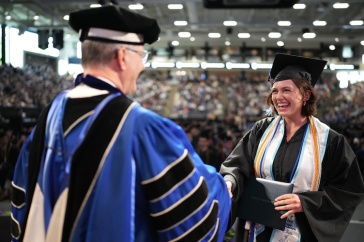
Ask people to describe “innovation” and their responses conjure up images of rare genius or a ground-breaking new standard. While these impressions ring true, innovation can also be found in the incremental steps of change. The creative thinking used to develop high-quality online higher education carries its own innovative momentum.
With National Distance Learning Week 2022 (Nov. 7-11) approaching, UNH faculty members share their philosophy, techniques and advice for best practices in online teaching. Exploring new methods to engage online students, they leverage technology to drive subject mastery, enhance problem-solving and improve leadership skills while fostering high touchpoint communication. The common thread among them is a strong desire to offer the best possible education using creativity and innovation as their guideposts.

Tuck Pescosolido, associate professor of Business Administration at Paul College, has taught courses in the online MBA program for ten years. Self-assessment tools for students in his human behavior classes connect the material with their workplace experience. He remarks: “Online teaching poses a professional challenge well in tune with the trending direction of higher education. This the way the world is going and I want to play my part.”

Embracing the online environment, Michael Gildersleeve, principal lecturer in Computer Science and IT program coordinator at the College of Engineering & Physical Sciences, developed a library of increasingly sophisticated video clips that he now uses to enhance his on-campus classes. “Innovation comes from the desire to maximize the student experience and what we do to achieve this goal is a common-sense refinement of the teaching process,” said Gildersleeve.

Chair of the Department of Security Studies and Program Director of the Global Conflict & Human Securities online program, associate professor Melinda Negron-Gonzales collaborated with UNH instructional designers to build a robust online course. She assigns students in collaborative pairs, then records her comments about the submitted class project in a conversational approach that feels personal and immediate.

Amy Thompson, program director of RN to BSN program with the Granite State Nursing Department, uses an innovative video grading system that shows the student’s paper on screen while she verbally records her comments, demonstrating improvements by accessing external examples. “Video grading is much quicker than posting comments on a written document. Many faculty now embrace this as part of their teaching toolbox. I love using technology to enhance the student experience,” said Thompson.

Senior lecturer and program coordinator of Wildlife and Conservation Biology with the College of Life Sciences and Agriculture, Jennifer Purrenhage teaches in both asynchronous and synchronous environments. Using Zoom for real-time classes, she scans the chat section, calling out questions while her assistant posts supporting links and materials. This exchange fosters thought-provoking discussion and a high level of student participation.

A lecturer on Molecular, Cellular and Biomedical Sciences with the College of Life Sciences and Agriculture, Davida Margolin teaches online Germs 101 in both online environments. Posting materials up-front gives asynchronous students the latitude to work ahead of schedule. During Zoom classes, Margolin employs Mentimeter to administer quick knowledge checks, awarding bonus points to students with the highest score.
A common refrain among faculty is that student participation is much higher online than face-to-face. "I find that asynchronous students study the material more closely and participate at a higher level,” said Margolin. Since asynchronous online students can manage their own study schedule, they have more time to absorb the material and the advantage of reflection to formulate their thoughts.

Aware of an increasingly diverse online student audience, Trish Cox, clinical associate professor and program director of the Master of Social Work program, is sensitive to the full spectrum of student needs. She works closely with UNH Student Accessibility Services (SAS) to craft a department-wide universal course design for equitable access by all learner types.
How should an instructor new to online teaching tackle this pedagogy? The collective advice from UNH faculty is to seek professional training on distance education best practices and to make full use of instructional design expertise. Many faculty also note the importance of tapping into peer experience and the benefit of being open to feedback.
“My advice to colleagues new to online teaching is to “own their online space” by honoring their teaching style. The best student learning experience results when instructors adopt online tools that work well with their own personality,” says Purrenhage.
UNH Online facilitates and markets graduate-level online master’s and doctoral degree and certificate programs geared to the working professional looking to further their education and enhance their career options.
Interested in exploring opportunities for online teaching for your program or college? Email Heather Holland.
-
Written By:
Gwendolyn Goguelet | UNH Online | unh.online@unh.edu
















































